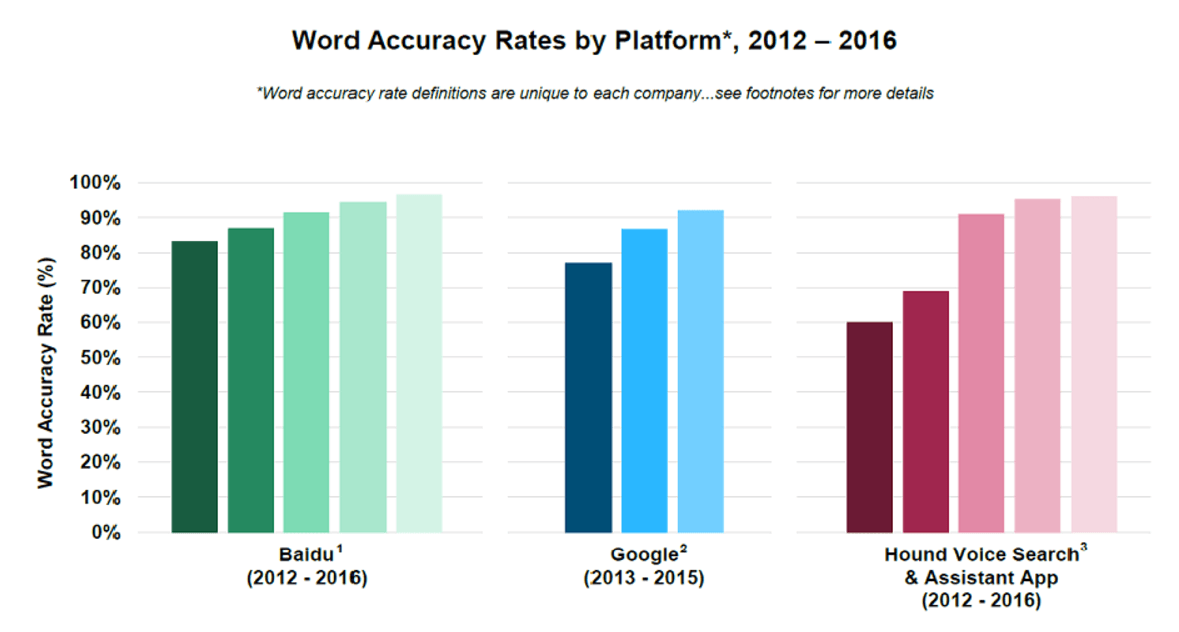
How to prepare for the evolution to voice search led marketing
There are roughly 33 million voice-first devices in circulation, including the Amazon Echo and Google Home.
Sundar Pichai, CEO of Google Inc., announced at Google I/O that over 20% of mobile queries are conducted by voice search. This seems like an enormous amount, and one that ComScore predicts will more than double in the next three years.

This isn’t shocking. ComScore thinks that 40% of adults use voice search at least once per day. It makes sense when you think about it. We can speak 150 words a minute, but only type around 40. Why wouldn’t we use voice search?
The technology behind voice searches are improving too. Accuracy rates have increased massively year-on-year, with most platforms having an accuracy rate of above 90%.

All of this new technology means that it is becoming easier and easier for consumers to make the small step to voice search.
So, what’s next?
Voice search in TV seems like the next logical step after desktop and phones. We’ve already seen a lot of tech giants expressing interest in TV as a medium, including Facebook.
Many TVs are already voice control enabled, so it makes sense that this would lead to voice search as well.
We’ll likely see the obvious key players monopolise this early, including Netflix and Amazon. Searches on TV are likely to be TV-related, so owning the SERPs from the start will be necessary for these brands. They’ll need to funnel users towards their own programming and strengthen their own hold on TV.

Amazon has already made a little headway here, through the use of their Amazon Firesticks. The newest iteration of these Fire sticks contains Amazon’s voice assistant Alexa, meaning that the TV itself does not have to be voice-enabled. Any TV can become a smart streaming box.
The addition of Alexa to any TV will allow a user to browse TV through the Firestick, but also use any of Alexa’s other skills. They’ll be able to check their commute, get a weather forecast and even bring up a recipe.
This is a smart move by Amazon, as the average voice-enabled TV retails at around £600. On the other hand, an Amazon Firestick with Alexa retails at £40.

Voice searches in cars seems like the next logical step, after the home. SEO wizard Rand Fishkin mentioned voice search as something that may become big in the future in his Whiteboard Friday about voice search. He pulled out Tesla as an example, saying that voice searches in cars were becoming increasingly common.
This doesn’t seem unfounded, as reported in MindMeld’s intelligent voice assistants report. Car firms have even spotted this, with Hyundai having already teamed up with Google to make their cars voice operable to some degree – as reported here by TechCrunch.
Therefore, it doesn’t seem like much of a stretch to imagine that Tesla or Google would add voice commands and voice search to their cars. Tesla already has some voice commands built into the Tesla Model S that are powered by Google voice recognition, including a ‘Where is’ feature.
What can I do from here?
Prepare. Make sure that you are up to scratch on all the guidelines that are around so far.
All of the major players in voice search have their own set of guidelines that you should read. Try and optimise towards the search provider that you’ll be using the most, but still maintain a good middle ground.
The Apple guide on how Siri can use voice search is very visual and is worth reading even for experienced iPhone users. Microsoft has a similar one for Cortana, and Google has its own for Ok Google!
For a more technical approach, CNET has a complete list of Siri commands, Ok Google commands and Cortana commands that are useful.
Go mobile first!
I honestly can’t believe I’m still having to say this, but you need to go mobile-first – if you haven’t already (and no, mobile-first is not the same as being responsive)
“In fact, today, over 50% of our queries come from mobile phones.”
Sundar Pichai
Most voice searches will be happening on mobile, so make sure that your site is at least mobile-friendly.
Use natural language
It’s hardly shocking news, but most voice search queries use natural language – so you should too. We’re searching with our voice, not a keyboard. This means we’re more likely to search in the same way we speak, rather than in short key phrases.
When optimising your website, you’ll want to focus on long-tail keywords that are more conversational in nature to include those people searching through voice-first devices.
Be informative
At the minute, the shopping functionality of voice search is very, very basic. Only the Amazon Echo even has the power to purchase products, and even that isn’t available in every country.
Using a voice assistant to purchase something doesn’t seem to be popular either. Of users who use the Amazon Echo, only 10% repeatedly use it to add items to a shopping list.
Therefore, you should be looking to inform, rather than sell, when optimising for voice search. Nearly 50% of people are now using voice search to research a product before purchasing, so you should be looking to answer their questions.
The holy grail of voice search is the Google Quick Answer boxes. Most voice search products, especially Google Home, will simply read out the answer from the Answer Box.
In order to make the most of this, you’ll need to create content that focuses on answering the questions that customers will have about your product at every stage of the purchase cycle.
We can’t predict everything
As with all new technologies, there will absolutely be new issues that nobody can predict. Unique issues that pertain exclusively to voice search will make themselves known, but try not to focus on that.
Instead, we should be spending our time making sure that we’re doing what we can. This means moving away from the search box and keyboard. Voice is the future, and it’s going to be here sooner than you think.
